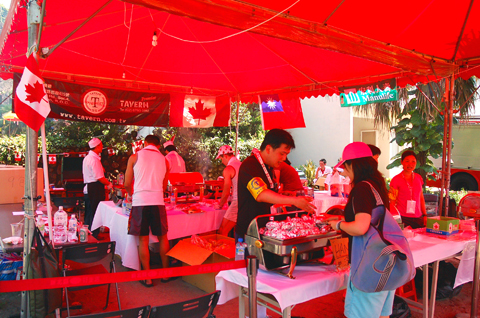When you could spend Canada Day eating hamburgers, dancing and playing on the beach, and listening to bands, why would you choose to work all day instead? Almost 100 volunteers come together to make the Canada D'eh Party at Baishawan (白沙灣) beach happen; last year the same volunteers who were checking tickets at the door at noon were still working at sundown.
"When you do something difficult, and it goes off well, there's a lot of satisfaction at the end of the day," says volunteer and Canadian Society board member Brian Rusk. "You get to meet people, talk to people and be a part of something that went off smoothly." Nonetheless, with so many fun things to do throughout the day - volleyball, foosball and tug-o-war, with four Luxy DJs spinning on the beach - there is a need to balance work and play.
"This year we want the principal volunteers to be able to enjoy it more," Rusk says. "Last year we were so concerned with making sure things were going well, which they were! This year we want to make sure people have the time to really enjoy it."

PHOTO COURTESY OF THE CANADIAN SOCIETY TAIWAN
Pascale Dangoisse, chief organizer of all the volunteers, says volunteers are usually "people that you've asked straight out. There was direct contact with a lot of the volunteers - 70 percent to 75 percent are Canadian Society of Taiwan members or friends of members - it was mostly done by word of mouth." Despite wearing a cast this year, Dangoisse is enthusiastic about the event, and concurs with Rusk that meeting people is one of the main benefits of volunteering. "It's great to have all these Taiwanese, French-Canadians and English-Canadians come together and work on this one day: young, old, different professions - all these people come together to make it work."
A key figure behind the event is Pierre Loisel. "[H]e set up the first Canada day parties out at his place 25 years ago. It ran for several years then faded out," says Canada D'eh organizer Kevin Dempsey. Six years ago, when Dempsey joined the Canadian Society, the two met. "Pierre told me the stories and encouraged the idea to try it again. He says 'why don't we have a party' and then I started talking with [ICRT DJ] Rick Monday."
Three hundred people were expected to show up for the first Canada D'eh event; actual attendance was 600. Organizers expect 5,000 people to attend tomorrow's fest but have enough food and drink for 6,000.
At sundown the event moves from the beach to a field, where Aboriginal dancers will perform, followed by five bands: David Foster Syndicate, Johnny Fatstacks, .22, BoPoMoFo and 2 Acres Plowed.

April 28 to May 4 During the Japanese colonial era, a city’s “first” high school typically served Japanese students, while Taiwanese attended the “second” high school. Only in Taichung was this reversed. That’s because when Taichung First High School opened its doors on May 1, 1915 to serve Taiwanese students who were previously barred from secondary education, it was the only high school in town. Former principal Hideo Azukisawa threatened to quit when the government in 1922 attempted to transfer the “first” designation to a new local high school for Japanese students, leading to this unusual situation. Prior to the Taichung First

The Ministry of Education last month proposed a nationwide ban on mobile devices in schools, aiming to curb concerns over student phone addiction. Under the revised regulation, which will take effect in August, teachers and schools will be required to collect mobile devices — including phones, laptops and wearables devices — for safekeeping during school hours, unless they are being used for educational purposes. For Chang Fong-ching (張鳳琴), the ban will have a positive impact. “It’s a good move,” says the professor in the department of

On April 17, Chinese Nationalist Party (KMT) Chairman Eric Chu (朱立倫) launched a bold campaign to revive and revitalize the KMT base by calling for an impromptu rally at the Taipei prosecutor’s offices to protest recent arrests of KMT recall campaigners over allegations of forgery and fraud involving signatures of dead voters. The protest had no time to apply for permits and was illegal, but that played into the sense of opposition grievance at alleged weaponization of the judiciary by the Democratic Progressive Party (DPP) to “annihilate” the opposition parties. Blamed for faltering recall campaigns and faced with a KMT chair

Article 2 of the Additional Articles of the Constitution of the Republic of China (中華民國憲法增修條文) stipulates that upon a vote of no confidence in the premier, the president can dissolve the legislature within 10 days. If the legislature is dissolved, a new legislative election must be held within 60 days, and the legislators’ terms will then be reckoned from that election. Two weeks ago Taipei Mayor Chiang Wan-an (蔣萬安) of the Chinese Nationalist Party (KMT) proposed that the legislature hold a vote of no confidence in the premier and dare the president to dissolve the legislature. The legislature is currently controlled